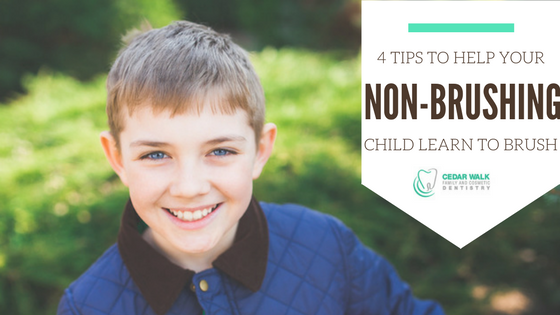4 Tips To Help Your Non-Brushing Child Learn to Brush

Three Signs of a Bad Tooth
January 30, 2017
ICOI Winter Symposium Workshop in New Orleans
February 20, 20174 Tips To Help Your Non-Brushing Child Learn to Brush
 Dr. Prashant Rao, DDS, a Charlotte native and NYU-trained dentist, specializes in esthetics, dental implants, and preventative dentistry.
Dr. Prashant Rao, DDS, a Charlotte native and NYU-trained dentist, specializes in esthetics, dental implants, and preventative dentistry.
You may know why it’s important to brush your teeth, but the concept of cavities or gum disease is most likely lost on your child. This is often why he or she doesn’t see the big deal when it comes to not brushing teeth. Kids can refuse to brush their teeth for a number of other reasons, though, from an attempt to assert themselves to a sensitivity to the toothbrush.
Having a child who won’t brush his baby teeth might not seem like a cause for concern; he will lose them soon anyway. But tooth decay is one of the most common chronic conditions in kids, affecting about 20 percent of those between the ages of five and 11, according to the Centers for Disease Control and Prevention (CDC). And not brushing now can cause your child discomfort, as well as problems with eating and speaking, well into the eruption of their adult teeth. It also sets up a pattern of not brushing in the future, which can lead to health issues in other parts of the body.
If your child won’t brush, there are a few ways you can establish this healthy habit.
1. Make a Reward
Giving your child a reward for brushing should be a regular item in a parent’s arsenal, but the reward that works best will depend on your child’s age and interests. Someone under the age of eight, for example, may be receptive to a funny bedtime story before lights out – but only after he brushes.
For an older child, a good reward might be letting him watch an episode of a favorite TV show between brushing and bed. If your child fusses about brushing his teeth, remind them the time he spends complaining will cut into this bonus playtime. Keep in mind, however, that physical activity can make it harder to fall asleep; be sure to keep this incentive to a minimum.
2. Make It a Game
Similar to offering your child a reward is turning tooth brushing into a game. Put on an upbeat song for two minutes (the appropriate brushing time) while your child brushes, and have a mini-dance party. Another option is to create a star chart wherein each time your child brushes without being asked, morning and night, he gets a star or sticker. Having earned five stars, your child qualifies for a prize. If he makes it to 10, offer something slightly better. Two or more children might transform your star chart system into a friendly competition – the one who earns five or 10 stars first gets the best prize, for instance. If they tie, you can give them the same thing. Just make sure this reward doesn’t counter all the hard work they did to clean their teeth!
3. Give Your Child a Choice
You don’t want to give your child the choice of not brushing teeth because, at this stage, he may take you up on it. To encourage him to embrace the routine, however, you can give him a choice of which products to use. Bring your child through the oral care aisle to pick out a brush and toothpaste that stands out. He may be surprised to find a product featuring a beloved cartoon character, such as SpongeBob Square Pants™ Mild Bubble Fruit®.
4. Check for Sensitivity
The refusal to brush might have little to do with assertiveness and a more do with sensory issues. Some kids are more sensitive to touch than others, which makes tooth brushing especially unpleasant. Children with autism or attention disorders are likely to have sensitivities that affect oral care, in particular, according to the Special Care Dentistry Association. If you suspect your child’s resistance to brushing is linked to a sensitive mouth, there are a few options for coping with it.
As with most difficult phases of your child’s life, this one will soon pass. Figuring out a way to work with your child through it will help everyone healthy and collected until it’s an effortless part of the daily routine.
Practice Recognitions
Recent Posts
- How Long Do Same-Day Crowns Last?
- Top Cosmetic Dental Procedures: Start 2025 With a New Smile
- What is a Zirconia Crown
- How To Know If You Need a Root Canal
- Invisalign FAQ: Your Top Questions Answered!
- Invisalign vs. Smile Direct: What Is The Difference?
- Itchy Gums: Causes, Relief, and Prevention
- The Benefits of Dental Implant Surgical Guides
- Wisdom Teeth Removed: 5 Signs You May Need to Remove Yours
- Tips For Wisdom Teeth Pain Relief: All You Need To Know





